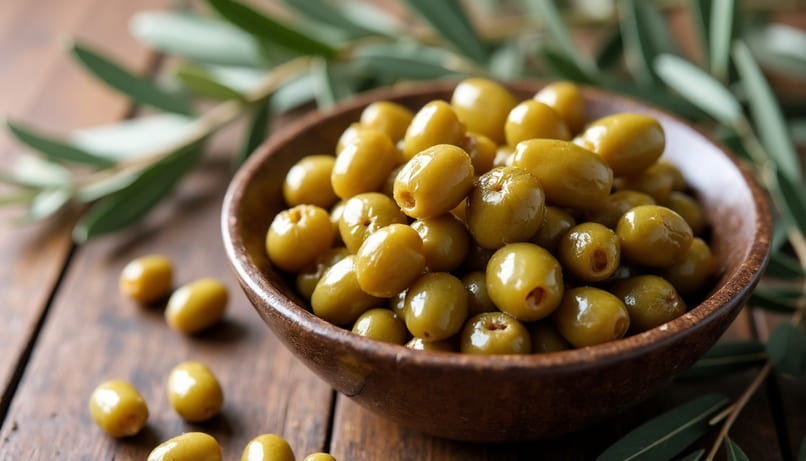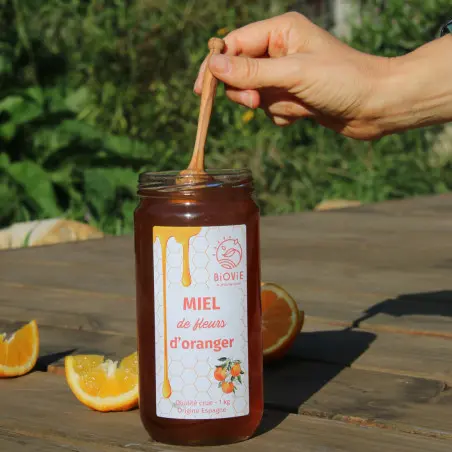Honey and the olives are two ancient foods with multiple virtues. Although very different, they share a fascinating common point: they are both naturally fermented foods.. In this article, we will explore the benefits of fermentation and the unique properties of honey and olives, thus offering a new perspective on these familiar ingredients.
By reading this article, you will discover:
- The natural fermentation processes of the honey and olives ;
- The specific benefits of these two foods for your health ;
- How to incorporate honey and olives into your diet ;
- Surprising information about these ancient foods.
Natural fermentation: an ancient beneficial process
Fermentation Fermentation is an ancient process that has allowed civilizations to preserve food while enhancing its nutritional value. This process involves the action of microorganisms, such as bacteria and yeasts, which transform the natural sugars in foods into acids, gases, or alcohol. These transformations not only extend the shelf life but also improve the digestibility and nutritional properties of the food.
In the case of honey and olives, fermentation take distinct but equally fascinating paths. Honey, although it does not ferment in the traditional sense, undergoes a maturation process where natural enzymes play a crucial role. Olives, on the other hand, undergo a true transformation thanks to the Lactic fermentation, an essential process to eliminate their natural bitterness and develop complex and pleasant flavors. Understanding these mechanisms allows you to appreciate these foods in a new light and wisely incorporate them into your living diet.
The fermentation of honey: a unique phenomenon
The maturation process of the honey is fascinating and deserves special attention. Unlike foods that ferment traditionally, honey undergoes an enzymatic transformation that gives it unique properties. During the production of honey, Bees collect nectar from flowers and transform it into honey in their hives. This process involves the action of natural enzymes present in the bees' saliva, notably invertase, which breaks down complex sugars into simple sugars, providing a natural and more nutritious alternative to white sugar, while giving honey its distinct sweet flavor.
This enzymatic maturation plays a crucial role in the development of the beneficial properties of honey. An interesting aspect is the formation of hydrogen peroxide, a compound with powerful antibacterial properties. This phenomenon contributes to the long preservation of honey and its positive effects on health.
Beneficial bacteria present in the honey also have notable importance. Although honey is not a probiotic in itself, it promotes a healthy environment for good bacteria in our digestive system. Due to its low water content and natural acidity, honey acts as a protective agent against undesirable pathogens.
By incorporating raw honey into your living food, you can enjoy its natural benefits while adding a sweet touch to your raw recipes. You can check out our category on our store for Honeys direct from Andalusia and discover how this exceptional product can enhance your dishes.
The fermentation of olives: from bitterness to flavor
The transformation of olives thanks to fermentation is a captivating process that transforms a naturally bitter fruit into a treat rich in flavors. Everything begins with the harvesting of olives, which are then immersed in a brine, a solution of water and salt. This salt bath plays a crucial role, initiating the lactic fermentation process. During this process, the lactic bacteria naturally present on the olives multiply and transform the bitter compounds, such as oleuropein, in lactate, thus softening the taste of the olives and developing more complex flavors.
The fermentation steps can vary in duration and technique, greatly influencing the final taste. In general, the Fermentation can last from a few weeks to several months. Some traditional methods, such as those used in Mediterranean regions, include the use of wooden or ceramic fermenters that add an extra dimension of flavor.
This process not only removes the bitterness from olives but also enriches their nutrient composition. Fermented olives are an excellent source of probiotics, those beneficial bacteria that support gut health. Additionally, they retain a wealth of polyphenols, powerful antioxidants that contribute to the protection of our body against oxidative stress.
Understanding the fermentation of olives allows for a better appreciation of the perfect marriage between artisanal tradition and modern nutritional benefits. By incorporating these little wonders into your living food, you enjoy an explosion of flavors while naturally supporting your health.
The benefits of fermented honey
Fermented honey is much more than just a natural sweetener. Its rich nutrient composition makes it an exceptional food, whose benefits are enhanced by the process of Fermentation. This phenomenon transforms honey into a true elixir of benefits, thanks to an increased concentration of nutrients and the emergence of new beneficial compounds.
Antibacterial and antioxidant properties
Fermented honey is a true treasure of health benefits, mainly due to its remarkable antibacterial and antioxidant properties. These properties largely stem from the formation of the hydrogen peroxideand during the fermentation process. This natural compound acts as a powerful antiseptic, contributing to protecting our body from harmful bacteria. This antibacterial action is particularly beneficial for preventing infections and supporting good oral health.
In parallel, fermented honey is a rich source of polyphenols and of flavonoids, antioxidants that play an essential role in neutralizing free radicals. These unstable molecules are responsible for oxidative stress, a process that can damage cells and contribute to premature aging as well as various chronic diseases. Moreover, thanks to its natural composition and fermentation process, fermented honey can have a positive impact on blood sugar levels by reducing glycemic spikes often associated with refined sugar. Due to its high concentration of these protective compounds, honey helps strengthen our immune system, improve cellular health, and increase our overall vitality.
These characteristics make fermented honey much more than just a simple natural sweetener. He becomes a valuable ally for those who wish to incorporate functional and nutrient-rich foods into a living food. By choosing raw and fermented honey, you benefit from a product that is not only delicious but also extremely beneficial for your daily well-being.
Immune system support
Fermented honey plays a significant role in supporting the immune system, thanks to its beneficial properties on gut health. Indeed, the intestine is often considered the center of our immunity, housing a wide range of bacteria that make up our gut microbiota.
Benefits of fermented honey for immunity
- Proliferation of good bacteria : When we consume fermented honey, we promote an environment conducive to the proliferation of beneficial bacteria, essential for the proper functioning of the immune system.
- Strengthening of the intestinal barrier : Studies have shown that honey stimulates the growth of good gut bacteria, strengthens the intestinal barrier, and reduces inflammation, thereby improving the overall immune response.
Bioactive Compounds and Immune Modulation
Honey contains bioactive compounds such as:
- Flavonoids
- Polyphenols
These compounds help modulate immune responses, providing additional protection against infections and diseases.
How to incorporate fermented honey into your diet
Incorporating raw and fermented honey into your live diet can be an effective strategy to strengthen your immune system. Here are some ideas:
- Use it as a natural sweetener in your Smoothies.
- Add it to some raw preparations to maximize its benefits while enjoying its sweet and mild taste.
This practice not only supports your daily health but also your long-term vitality, keeping your immune system robust and ready to defend you against external threats.

The virtues of fermented olives
Fermented olives, true treasures of Mediterranean cuisine, are much more than just a delicacy. They offer nutritional richness and health benefits that deserve to be explored. At the heart of these advantages are the processes of natural fermentation which not only soften the bitterness of olives but also significantly enrich their nutrient composition and nutritional profile. By incorporating fermented olives into your diet, you not only enjoy deep and complex flavors but also benefit from a valuable source of essential nutrients that support your overall well-being.
Source of natural probiotics
One of the most beneficial characteristics of fermented olives lies in their natural probiotic content. Lactic bacteria, abundantly present in fermented olives, play a crucial role in maintaining a healthy intestinal flora. During the fermentation process, these bacteria produce lactic acid, an essential compound that helps create a favorable environment in the intestine by inhibiting the growth of harmful microorganisms. Beneficial microorganisms help balance the gut microbiota, which is essential for a good digestion and a better nutrient absorption. Furthermore, a balanced gut flora is fundamentally linked to a strong immune system, thereby enhancing your resistance to infections and diseases. Fermented olives thus become an ideal ally for those looking to support their digestive and immune health in a tasty and natural way.
Rich in antioxidants
Fermented olives are an exceptional source of polyphenols, antioxidant compounds that play a crucial role in protecting our body against oxidative stress. This oxidative process, caused by free radicals, can damage cells and contribute to premature aging as well as the onset of chronic diseases. The polyphenols present in fermented olives help to neutralize these free radicals, thereby supporting cellular health and reducing the risk of inflammatory and cardiovascular diseases.
In addition to polyphenols, fermented olives contain other major antioxidant compounds such as oleic acid, recognized for its beneficial effects on heart health. These antioxidants work together to provide integrated protection against various environmental and physiological stressors. By incorporating this food into your diet, you not only enjoy its delicate flavor but also its health benefits for strengthen your immune system and boost your overall vitality.
Fermented olives, whether green or black, are much more than just a pleasurable food. Their richness in nutrients and protective compounds makes them essential for those looking to improve their health in a natural and delicious way. Green olives, with their more intense and bitter flavor and high polyphenol content, and black olives, sweet and rich in healthy fats, offer complementary benefits. By regularly incorporating them into your dishes, you actively contribute to your well-being while enjoying an authentic and traditionally prepared product.

How to incorporate honey and olives into your raw food diet
The integration of honey and olives into a raw food diet offers a delicious and nutritious way to enjoy their many benefits. These foods, valued for their unique properties, can easily be incorporated into your daily routine without the need for cooking. Discover here how you can use them to enhance your dishes while adhering to the principles of theraw food.
Honey, a natural and living sweetener
The raw honey is a treasure of nature, offering much more than just a sweet note to your preparations. It is the perfect touch for those looking to incorporate natural and living sweeteners into their raw diet. Add a tablespoon of honey to your Smoothies to bring natural sweetness and a real energy boost. Imagine a smooth blend of fresh fruits, green vegetables, and a generous spoonful of raw honey, creating a drink as delicious as it is energizing.
For your raw desserts, raw honey proves to be a valuable ally. Whether it's nut-based pies or creamy desserts, a touch of honey adds sweetness and complexity without compromising your commitment to a wholesome diet. In addition to its delicious taste, raw honey offers antibacterial and antioxidant properties that enrich every bite.
By exploring different varieties of honey, you can diversify your recipes and benefit from specific advantages depending on the floral origin of the chosen honey. On our store, we offer you orange blossom honey from Andalusia as well as from the avocado flower honey. Let yourself be inspired by the richness of this natural product and incorporate it without hesitation into your daily diet for an exceptional taste and nutritional experience.
Olives, a versatile fermented condiment
Fermented olives lend themselves to countless culinary uses, adding a note of complexity and richness to your raw dishes. Thanks to their savory profile, they transform a simple salad into a Mediterranean experience. Incorporate fermented olives into your Raw salads is a simple and effective way to enjoy their unique taste. They pair wonderfully with fresh ingredients such as tomatoes, cucumbers, and aromatic herbs, enhancing the flavors while increasing the nutritional value of the dish.
Beyond salads, fermented olives can also be used in the preparation of raw vegetable pâtés. By finely chopping them and mixing them with nuts or seeds, you will create a tasty paste that can be served as a spread or a side dish. These pâtés are perfect for topping lettuce leaves or vegetable slices, offering a healthy and delicious snack that adheres to the principles of a raw food diet.
Incorporating fermented olives into your diet allows you to benefit from their probiotic and antioxidant properties while enjoying delicious dishes. By exploring these various applications, you will discover how easy and enjoyable it is to integrate these fermented foods into your daily regimen.

Conclusion
By incorporating fermented honey and olives into your raw diet, you benefit not only from their nutrient richness but also from their unique properties that support overall health and well-being. Raw honey, thanks to its natural fermentation, offers antibacterial and antioxidant benefits, while providing a naturally sweet and complex touch to your preparations. On the other hand, fermented olives enhance your dishes with their probiotic and antioxidant content, while adding flavor and depth.
These fermented foods perfectly illustrate how culinary tradition and nutritional science can come together to create products that are both delicious and beneficial for health. We strongly encourage you to explore these natural treasures and incorporate them into your dietary routine. To continue discovering tips on raw food and stay informed about the latest trends in natural fermented products, feel free to subscribe to our newsletter. It's an opportunity to join a community passionate about healthy and sustainable eating.
Your questions and our answers (FAQ)
What are the health benefits of olive fermentation?
The fermentation of olives improves their digestibility and enriches their nutrient content. This process reduces the natural bitterness of olives while increasing their probiotic content, which promotes a balanced gut flora. Additionally, fermented olives are rich in polyphenols, powerful antioxidants that help protect the body against oxidative stress.
How is honey considered a fermented food?
Although honey does not ferment in the same way as traditional foods, it undergoes enzymatic maturation. The natural enzymes present in honey transform complex sugars into simple sugars, thereby increasing its antibacterial and antioxidant properties. This unique maturation process contributes to the long shelf life of honey and its beneficial effects on health.
How to incorporate fermented honey into a raw food diet?
Fermented honey can be used as a natural sweetener in many raw recipes. Add it to your smoothies for a sweet and nutritious touch, or incorporate it into raw desserts like nut-based pies and creams. This integration allows you to enjoy its antibacterial and antioxidant properties while enriching your dishes with unique flavors.
Why are fermented olives considered a natural probiotic?
Fermented olives contain lactic acid bacteria, which develop during lactic fermentation. These beneficial bacteria support gut health by balancing the microbiota, which improves digestion and strengthens the immune system. Regular consumption of fermented olives can therefore contribute to better digestive and immune health.
What are the benefits of fermented honey for the immune system?
Fermented honey supports the immune system primarily by promoting an environment conducive to the proliferation of good bacteria in the gut. It also contains flavonoids and polyphenols, which modulate immune responses and offer protection against infections. By incorporating raw and fermented honey into your diet, you strengthen your immune system and improve your overall well-being.
How can fermented olives be used in a raw food diet?
Fermented olives can be added to salads for a Mediterranean flavor or used in raw vegetable pâtés to add texture and taste. They bring a savory and complex dimension to your dishes while offering the benefits of probiotics and antioxidants.













